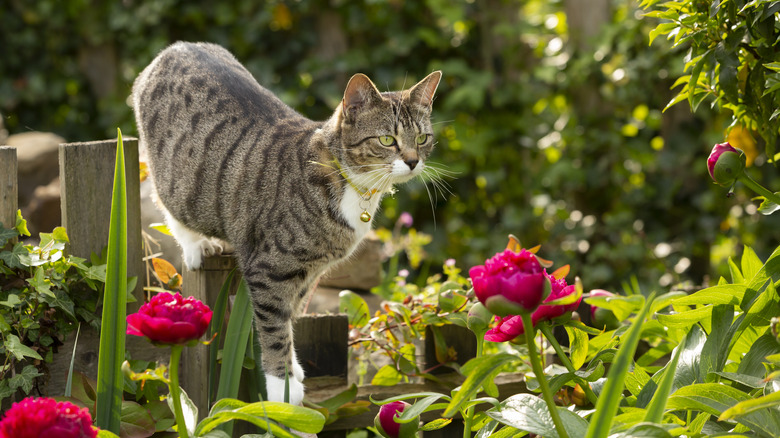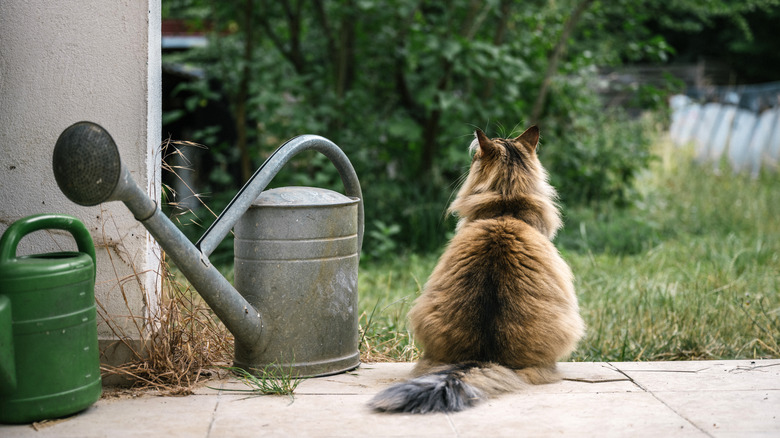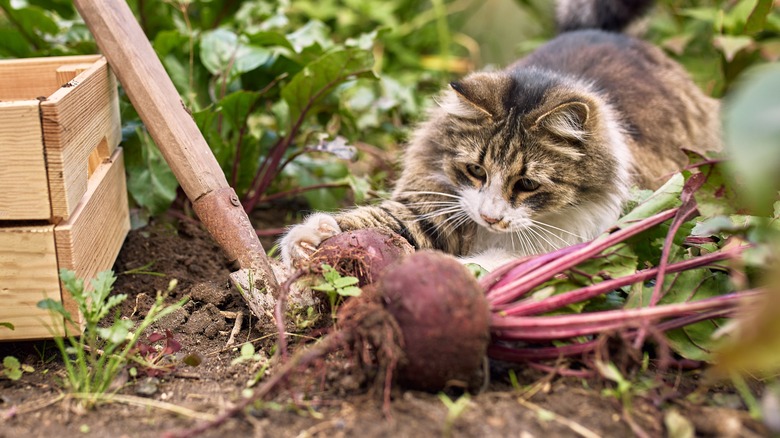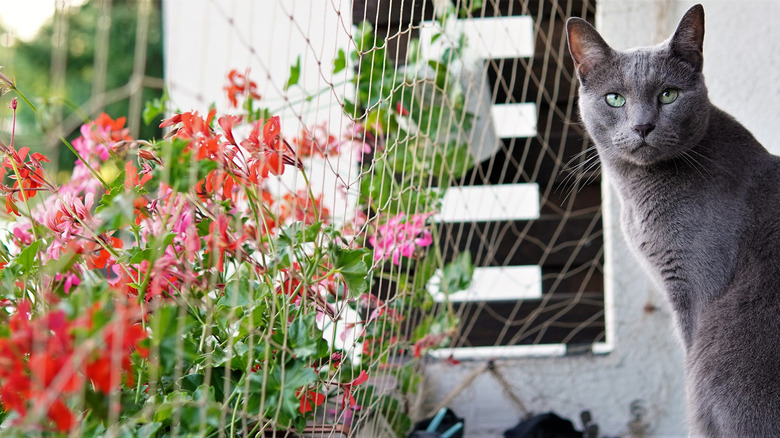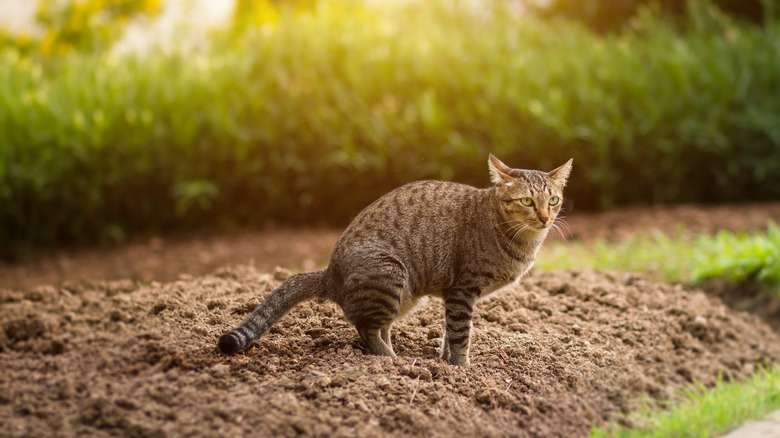How To Keep Cats Out Of Your Garden
Outdoor cats are an adorable addition to any neighborhood and can even help control local rodent and ground squirrel populations. The problem with outdoor cats is that they are almost too good at hunting and are responsible for killing many songbirds. This is not only bad for the environment, but the lack of birds in your garden may help annoying pests like aphids and beetles thrive. Plus, many birds are important pollinators and are beneficial for gardens.
On top of this, outdoor cats can do even more damage to your garden when they decide to make it their personal playpen or, worse, their litter box. While a cat using your garden as a toilet doesn't mean you can't eat your vegetables come fall, cat excrement does contain germs that can make humans sick. Because of this, you will want to make sure to wash your vegetables (especially the leafy green brassicas) thoroughly before consuming them if a cat has been active in your garden.
So, how can you keep cats out of your garden without harming them? Luckily, there are a few different methods for deterring cats from entering your garden and keeping your veggies and songbirds safe.
Take advantage of smells cats hate
One way to keep cats out of your garden is to add some strong scents that all cats dislike. Some options include cayenne pepper, lavender, peppermint, eucalyptus, and tea tree. However, the one that works the best and is most recommended by gardeners is citrus. Cats can't stand the smell of any citrus fruit from lemons and limes to oranges and grapefruit.
While some gardeners like to add orange or lemon essential oils around their garden perimeter or plant citrus-scented herbs in the garden (like lemon thyme), it seems that the most effective method is to simply fill your garden with citrus peels. This works because essential oils, while pungent, don't last very long, and lemon-scented herbs don't seem to give off a strong enough smell to deter determined kitties. However, the peels of citrus fruits have a strong, long-lasting scent.
In fact, according to one Redditor on the gardening forum of the website, although they used to have a problem with cats in their yard fighting all night, "[they] started spreading orange/lemon peels around the plants and the problem went away." Other commenters agreed and added that this method not only works but is cheap, fast, and safe for the mischievous felines.
Invest in a motion-activated device
If you want to keep your garden tidy and don't like the look of discarded orange peels all over the place, an alternative option is to invest in a motion-activated device. As cats hate water even more than they hate citrus, a motion-activated sprinkler is a great option. These sprinklers not only scare cats away but also help them associate your garden with a negative experience to keep them from coming back, all while benefiting your vegetables and flowers with extra hydration. However, if you live in an area that often experiences droughts and water bans, sprinklers may not be the best option.
If this is the case for you, then another option is to use a motion-activated ultrasonic device. These devices use an infrared laser system to detect intruders in your garden and then omit a high-pitched beeping noise that humans cannot hear but is startling to many animals — including cats. However, the problem with ultrasonic devices is that they need to be set to the right frequency and height to work properly. If it is set too high (above 12 inches), the sensor won't activate for small and medium-sized cats. Too low (below four inches), and it will go off for every tiny critter, from ground squirrels to mice. This may help your garden, but can also quickly wear out the battery.
Make the ground sharp or add a barrier
Cats have soft pads on the bottom of their paws and tend to prefer walking on comfortable and soft surfaces like dirt and grass. So, one way you can try and deter cats from spending time in your garden is to make the ground spiky and uncomfortable. There are a few ways of doing this which are recommended on many gardening websites. However, when tested by Epic Gardening, it was found that certain methods like eggshells, chopsticks, plastic forks, and pointy sticks don't really work. In fact, when the fork and chopstick method was tested, the cats simply pushed the upright utensils aside and did their thing anyway.
While this doesn't mean that these methods won't work for you, a few options that are likely more effective include laying down sharp mulch, pinecones, or spiky anti-cat mats. However, while this may be a good option for flower beds, if you are protecting a vegetable garden you may not want all your soil to be covered in rocks or sharp wood chips because it will also make it hard for you to work in the garden.
Although it may not look the best, one surefire way to make sure cats stay out of your garden is to fence it in with chicken wire or netting. This has the added advantage of being relatively inexpensive while also keeping out other pests like rabbits and squirrels.
Eliminate prey and add fake predators
If you want to keep cats away from your yard and garden, you need to make it as unattractive for them as possible. However, if your yard is full of delicious food, even gardens that smell of citrus and are covered in spikes may become worth it to a hungry kitty. To reduce the available food in your yard, you should make sure there's no bird seed on the ground (birds on the ground are desirable prey) and that there isn't any dog or cat food sitting out. You can also make sure that your garbage bins and compost are secure and inaccessible to limit the number of mice in your yard.
Once you've decreased the cat's food sources, you can also make it believe that your yard contains predators. There are multiple ways to do this, but one of the popular methods includes adding the scent of a predator. You can do this by adding predator urine (many websites recommend fox urine as a good option) or by spreading predator hair everywhere (usually dog fur is the easiest and cheapest way to do this). Another option is to purchase a bunch of toy rubber snakes and spread them around your garden. While this method is not proven, it has been anecdotally effective for many.
Make a decoy garden bed
If all else fails and your neighborhood is full of cats who want nothing more than to poop in your garden and dig up your plants, you may have to get creative and give them a better option. The best way to do this is to sacrifice another part of your yard to make a space that is so attractive to them that they would prefer to hang out and poop there instead of on your vegetables or flowers. You can do this by adding a small sandbox or by creating an empty garden bed full of dirt or peat moss that is perfect for digging and playing. You can also surround this sacrificial area with other things cats like such as catnip, valerian, and lemongrass to draw them there.
This method works especially well if the garden pooper is your cat or a cat you like and you don't mind them being in your yard but just don't want them in your garden. However, the downside of this option is that you will have to regularly clean the decoy litter box or dirt patch. Otherwise, the cat will revert to doing its business where you don't want it to.
